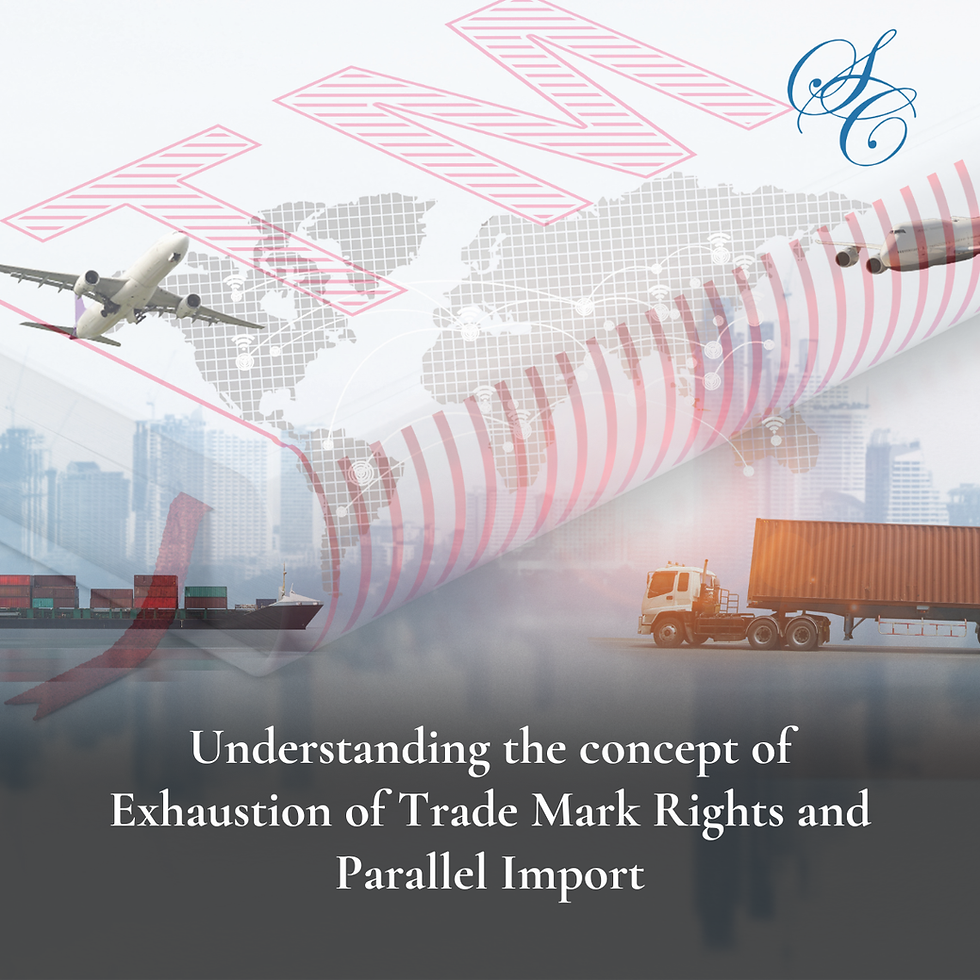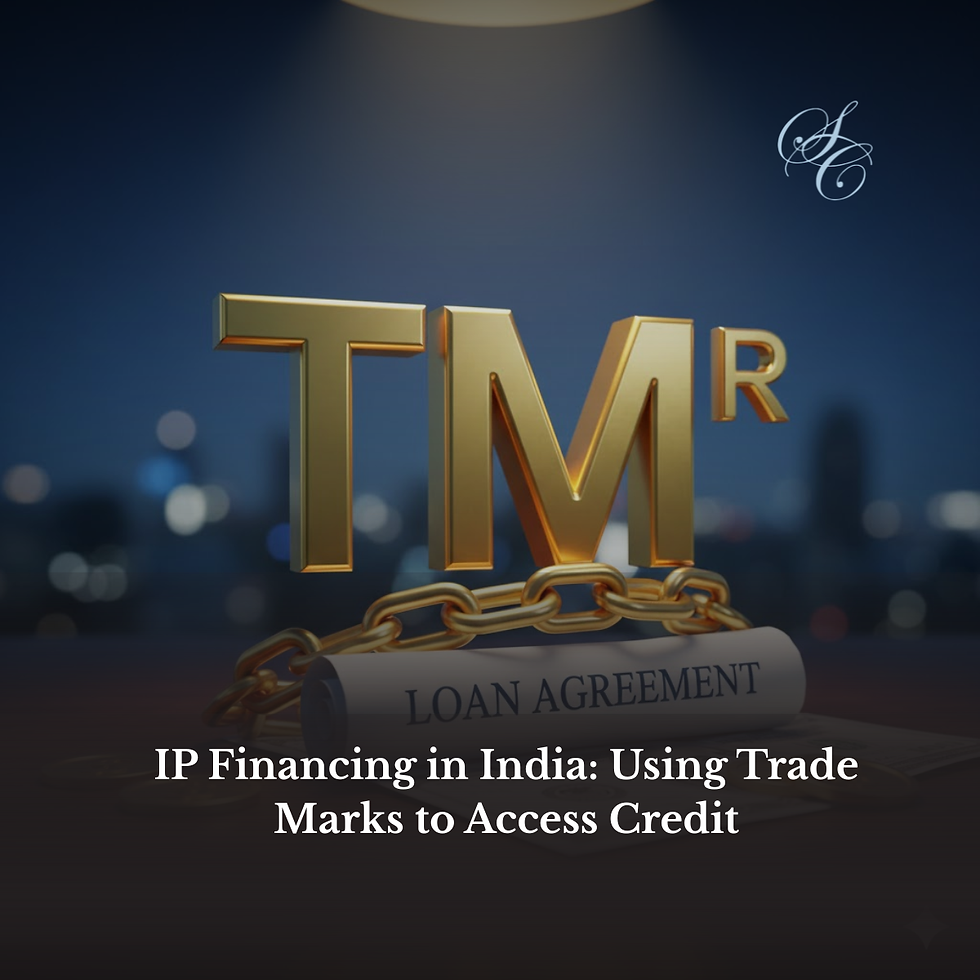Trade Marks and the Metaverse: Recent Trends in India
- Alvin Antony
- Sep 9, 2022
- 4 min read
Updated: Nov 14, 2022
In the post covid era, the ‘Metaverse’ has become one of the most hotly discussed technological advancements globally. More and more brands are choosing to launch their products and advertise them virtually through the Metaverse in an attempt to reach out to a younger tech savvy consumer base. While scepticism still surrounds the idea of the Metaverse, the race to secure intellectual property rights in the Metaverse is in full throttle. It would not be an exaggeration to say that, in a few years, the way we protect and enforce intellectual property rights may be shaped by the Metaverse.
What exactly is the Metaverse? In short, the Metaverse is a combination of virtual reality and augmented reality, that uses blockchain technology and digital media concepts, resulting in a 3D virtual world that enables building social connections, and mimics user interaction in the real world[1].
Indian stakeholders are not far behind in the race to secure trade mark rights for their brands in the Metaverse. A review of the Indian Trade Marks Registry’s (“Registry”) online database reveals that several parties have already obtained statutory rights on the standalone term ‘METAVERSE’ in several classes[2]. Further, several METAVERSE-formative marks and designs that feature the word METAVERSE have been registered[3] across classes. In addition to these, there are various applications for METAVERSE-formative marks that are in different stages of prosecution. It, therefore, appears that parties in India are racing to gain statutory rights for the term METAVERSE and METAVERSE-formative marks for any and all goods and services.
Surprisingly, the Registry has been granting such registrations without giving due consideration to Section 9(1)(c) of the Trade Marks Act, 1999, which states as follows:
“The trade marks…which consist exclusively of marks or indications which have become customary in the current language or in the bona fide and established practices of the trade, shall not be registered...”
Under this section, if a trade mark consists of words which have become customary in current language, it shall not be granted registration. Given that the Metaverse has taken the world by storm, and is a concept akin to Non-Fungible Tokens, Block Chain, Cryptocurrency, etc., it is unclear as to why registrations for the very identifier of a concept are being granted in the first place.
Another interesting point to note is that India is yet to see any trade mark applications where the description of goods/services itself contains the term ‘Metaverse’. Such filings would ensure protection of trade marks for use in the Metaverse, more specifically. So far, over ten jurisdictions around the world have granted registrations for marks where the specification of goods/services contain the term ‘Metaverse’[4]. Recently, however, a slew of applications by various entities were filed in relation to goods and services that are intended to be associated with, and used in, the Metaverse. For instance, one of the first Metaverse related registrations in India, covers “data processing equipment and computers, computer programs, downloadable virtual goods, namely, computer programs featuring footwear, clothing, headwear, eyewear, bags, sports bags, backpacks, sports equipment, art, toys and accessories for use online and in online virtual worlds” in Class 9.[5]
While some brands have now filed applications on the basis of various elements related to the Metaverse, a large number of businesses are uncertain as to how to categorize their Metaverse related goods and services under the NICE Classification. There is a fine line between categorizing goods/services as those in the real world vis-à-vis the Metaverse. While courts in India are yet to opine on this question, the European Union Intellectual Property Office (“EUIPO”), for instance, upon noticing the increasing number of filings related to the Metaverse, has provided practice tips on how to classify goods/services while filings such applications. For example, the EUIPO notes that “…the term virtual goods on its own lacks clarity and precision so must be further specified by stating the content to which the virtual goods relate (e.g., downloadable virtual goods, namely, virtual clothing).”[6]
Sophisticated and precise categorization of goods/services may become the deciding factor in determining rights of parties in the Metaverse in trade mark disputes in the future. Therefore, it is imperative that applicants have clarity on the elements and economics of the Metaverse and what constitutes virtual goods and services before filing trade mark applications to protect their rights.
Besides seeking statutory rights to protect their trade marks, several Indian businesses have also actively used their marks in the Metaverse[7]. For instance, the film industry has seen promotion of movies like Radhe Shyam[8] and KGF[9]through the Metaverse. Similarly, popular FMCG brands, like TATA Tea[10] and McCain Foods,[11] have organized festivities in the Metaverse, which were used as marketing tools to promote their upcoming products to a tech savvy generation of consumers. Such use has led to the expansion of the realm of common law rights into the Metaverse.
While courts in India are yet to analyse questions regarding trade mark rights in the Metaverse, there have been instances where some elements of the Metaverse, such as blockchain and cryptography, have been discussed basis Indian trade marks law[12]. Along with this, the Hon’ble Supreme Court’s observation that passing off is to be judged not merely from the existing users of the competing parties, but also from a futuristic perspective[13], reflects the court’s recognition of the marketplace being a dynamic and ever changing field. Naturally then, enforcement of trade mark rights will also evolve with time in relation to the Metaverse. Even though the Indian stance on the Metaverse is still in its initial stages of development, businesses are clearly trying to embrace the global trend. Given the rising interest of Indian business in expanding into the Metaverse, a detailed framework will be necessary in the near future to navigate protection of trade mark rights in the Metaverse, and avoid disputes.
[1] See: https://economictimes.indiatimes.com/markets/cryptocurrency/how-the-metaverse-future-may-look-like-in-2030/articleshow/91175337.cms
[2] Registration Nos. 5274786, 5070152, 5070154, 5200085, 5143274, 5070178, 5070193, 5200080, 5200084 and 5200079.
[3] See, for example, Registration Nos. 5258386 and 5291841.
[4]https://branddb.wipo.int/branddb/en/?q={“searches”:[{“te”:”metaverse”,”fi”:”GS_ALL”,”df”:”GS”}],”filters”:[{“fi”:”STATUS”,”te”:”ACT”,”co”:”OR”}]}
[5] Registration No. 5248715 (dated December 15, 2021) for the mark AJIO LUXE (Design).
[6] https://euipo.europa.eu/ohimportal/en/news-newsflash/-/asset_publisher/JLOyNNwVxGDF/content/pt-virtual-goods-non-fungible-tokens-and-the-metaverse
[7]See, for example: https://www.financialexpress.com/digital-currency/boat-hosts-metaverse-concert-floatverse/2640919/;https://www.financialexpress.com/digital-currency/kiya-ai-launches-kiyaverse-indias-first-banking-metaverse-heres-how-it-will-work/2546778/;https://www.financialexpress.com/digital-currency/kiya-ai-launches-kiyaverse-indias-first-banking-metaverse-heres-how-it-will-work/2546778/;https://www.yashodahospitals.com/news/1st-healthcare-group-in-india-to-be-on-the-metaverse-platform/; https://manishmalhotra.in/virtual-store/, https://hospitality.economictimes.indiatimes.com/news/operations/food-and-beverages/fabelle-becomes-indias-first-luxury-chocolate-label-to-make-its-debut-on-metaverse/89429646
[8]https://economictimes.indiatimes.com/magazines/panache/prabhas-draws-fans-into-metaverse-for-radhe-shyam-trailer-servers-crash-within-minutes/articleshow/90008484.cms
[9]https://www.thenewsminute.com/article/makers-yash-s-kgf-2-commence-sale-digital-avatars-metaverse-162696
[10]https://www.exchange4media.com/digital-news/tata-tea-celebrates-holi-by-hosting-party-on-metaverse-119129.html
[11]https://www.adgully.com/mccain-and-adfactors-pr-present-the-world-s-first-holi-on-the-metaverse-115524.html
[12] See, Bombinate Technologies Pvt. Ltd. v. KOO Coin and Ors. [CS (COMM) 524/2022], and Tata Sons Private Limited v. Hakunamatata Tata Founders & Ors. [CS(COMM) 316/2021]
[13] Laxmikant Patel v. Chetanbhai Shah and Anr. [(2002) 3 SCC 65[




Comments